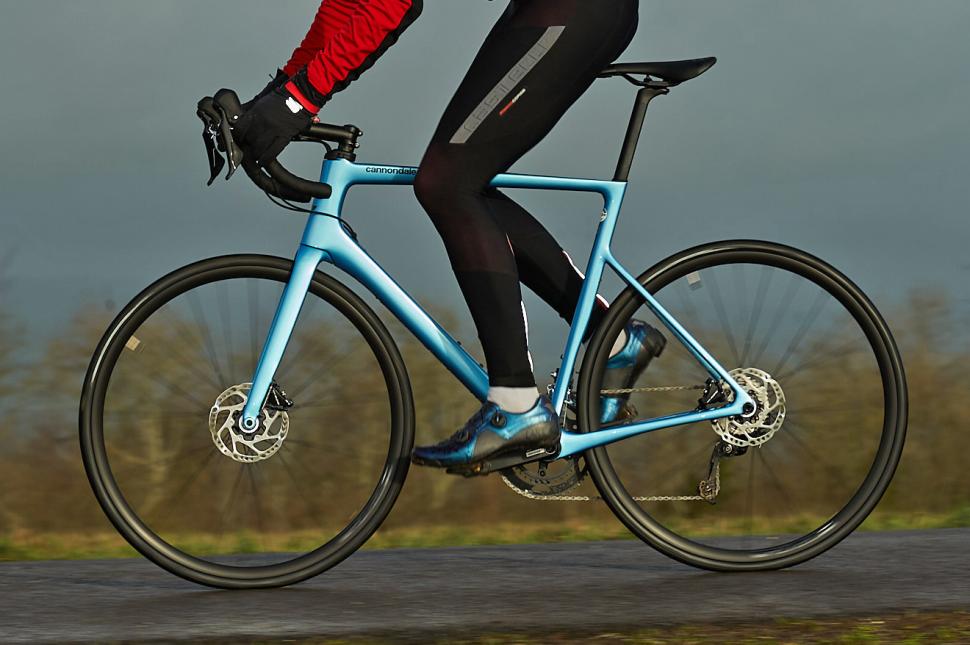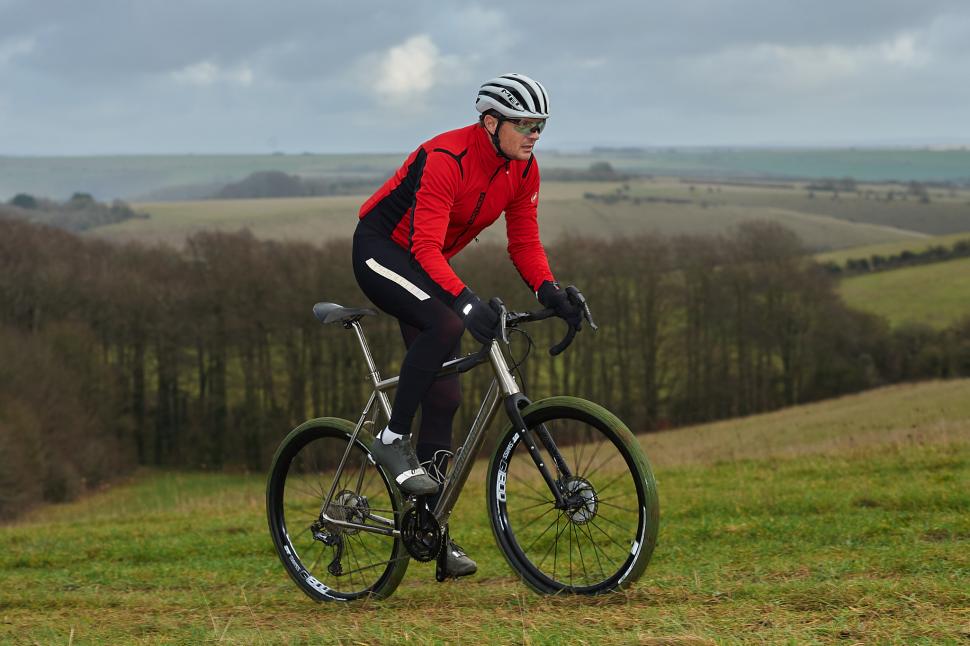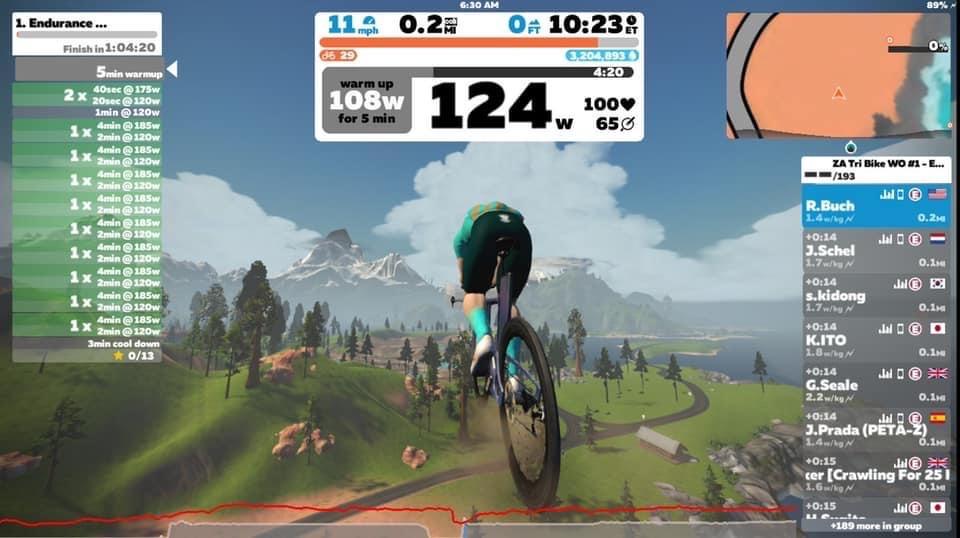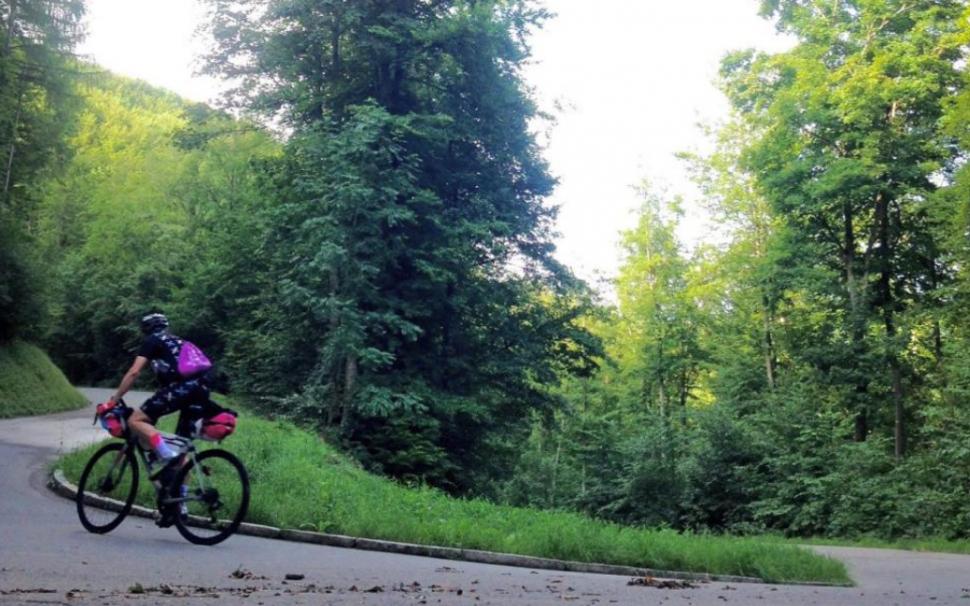- News
- Reviews
- Bikes
- Accessories
- Accessories - misc
- Computer mounts
- Bags
- Bar ends
- Bike bags & cases
- Bottle cages
- Bottles
- Cameras
- Car racks
- Child seats
- Computers
- Glasses
- GPS units
- Helmets
- Lights - front
- Lights - rear
- Lights - sets
- Locks
- Mirrors
- Mudguards
- Racks
- Pumps & CO2 inflators
- Puncture kits
- Reflectives
- Smart watches
- Stands and racks
- Trailers
- Clothing
- Components
- Bar tape & grips
- Bottom brackets
- Brake & gear cables
- Brake & STI levers
- Brake pads & spares
- Brakes
- Cassettes & freewheels
- Chains
- Chainsets & chainrings
- Derailleurs - front
- Derailleurs - rear
- Forks
- Gear levers & shifters
- Groupsets
- Handlebars & extensions
- Headsets
- Hubs
- Inner tubes
- Pedals
- Quick releases & skewers
- Saddles
- Seatposts
- Stems
- Wheels
- Tyres
- Health, fitness and nutrition
- Tools and workshop
- Miscellaneous
- Buyers Guides
- Features
- Forum
- Recommends
- Podcast
 Training Anna
Training AnnaWhat is the most effective time of day to train?
When should you train for the best results? Should you ride first thing in the morning when you’re completely fresh, leave it until the evening when you’re fully awake, or does it really not make a whole lot of difference?
Fitting regular cycling training into our busy day-to-day routines can be challenging; opportunities around other commitments may be limited and few and far between. For some of us, we squeeze it in where we can and it varies each week. But for those who have some choice in organising their schedule beforehand, are there any reasons for picking a certain time of day over another? How can we optimise the limited in-the-saddle time we have so that the most training adaptations can be made?
To understand, from both physiological and psychological points of view, we have spoken to experts in these fields to determine if there is an optimal time of day to train for maximum performance gains.
Circadian rhythms on athletic performance
Professor Ben J. Edwards of Liverpool John Moores University studies chronobiology, and asserts that our circadian rhythms can cause a variation in force and power production of up to 15 per cent. Circadian rhythms are physical, mental and behavioral changes that follow a 24-hour cycle which is influenced by the environment and the light-dark cycle.
Edwards explains: “The evolutionary process has designed something called the body clock in our brain. This suprachiasmatic nucleus is in the part of the brain called the hypothalamus and it is likened to a conductor in a orchestra—it keeps all of your molecular and protein clocks in time and in regulation.
“It means we stay active and awake during the daytime and sleepful during the night. It regulates our lifestyle: how alert we are, how motivated we are, how we recruit musculature and how we perceive effort.”
Core body temperature is used as an indirect measure and it varies by about one degree over the course of a day, Edwards says.
“It’s lower in the morning (~36.5 °C), higher in the evening (~37.5 °C) and charting gross muscular performance it follows this pattern. We are stronger between 17:00 and 20:00.”
> Tech news: Amp Human offers skin-applied bicarb to support training and recovery
This suggests that we should do our training sessions in the evening, but sweating it out in the evening is not effective if you can’t get sufficient sleep after completing the workout. The body needs to repair and recover. Edwards advises to complete your exercise at least three to four hours before you want to get some sleep, to avoid the endorphin rush and adrenaline that can make it difficult to fall asleep, and causes sleep deprivation.
> Advice: What should you eat to recover from cycling?
He says: “If you don’t have enough sleep, then you still haven’t taken full advantage of the biological systems evolution has given us.
“Cellular restitution occurs in the first half of your sleep cycle and this is when you heal and recover from the exercise you have completed in that day. Consolidation of memories happens in the second half—this is what you have learnt that day.”
Linked to this, Edwards reminds us that performance is composed of many different areas in the world of sport and so other areas can be focused on at different periods of the day.
He says: “You are better able to do higher cognitive function tasks around 12:00–that’s strategy. This is because in the morning when your core temperature is lower, all the fuzz in your brain that has built up during the night, is minimal—so your ability to learn a task is better.”
To summarise, simple skills are better first thing, at 12:00 it’s time for strategy, and power development is more effective at 17:00-20:00 hours.
But then there are the outliers. There are two groups of people who have a slightly different circadian rhythm. Edwards explains: “For morning types, the cycle advances and is about an hour earlier. Then there’s the evening types whose cycle is pushed back an hour.”
A simple test called the Morningness-Eveningneess questionnaire can be taken to determine where you fall. Only around 2.5% of the population are outright morning types, and likewise, 2.5% outright evening types.
But regardless of your circadian rhythm, put bluntly, Edwards says: “If you can’t fit evening workouts into your lifestyle, don’t mope about. Whatever time of day you train you are going to get gains from it. For humans, the optimal time of day to train is the time that you can spare. It needs to fit around your own lifestyle.”
Even though exercising in the evening is best for muscular adaptations, the morning has its own pluses. Training at the time of day of your targeted event is recommended, as it allows the body systems to adjust and prepared.
Prof Edwards says: “If you are in the habit of training at the same time of day as your competition, it won’t feel as hard.” A fair amount of events have an early start time, especially endurance events, and so one part of your preparation in the weeks leading up should be getting used to exercising at the time of your intended competition. This is a worthwhile reason for specifically choosing the morning over the evening for completing your workouts.
Completing your workout first thing is also advantageous because it means you have it done before the rest of the day takes over. As your day progresses, other pressing matters could be piled onto your to-do-list and your workout gets shoved further and further down your schedule, until… too late, its bedtime. With busy lives, it can be sensible to do a training session before the rest of the world interrupts at 9am.
Mental fatigue and perceived exertion
While physiological systems improve as the day goes on, the psychological dimension also needs to be considered.
Professor Jeroen Van Cutsem, psychophysiology researcher at Vrije Universiteit Brussel in Belgium, asserts that mental fatigue will affect sporting performance. He explains: “When you compare the physiological values that are known to influence your performance such as your VO2 max, heart rate, your peripheral values such as blood lactate and the values that indicate the peripheral metabolism, there aren’t any differences between a person that is mentally fatigued and someone who is not. But there is a difference in the perception of effort and how hard the interval seems to you at that time.”
Hitting your target watts and completing a training session as set, or intended, will be more difficult when in the psychobiological state of mental fatigue, and so will decrease your performance. Prolonged periods of a demanding cognitive activity such as a day of office work could induce mental fatigue; so does this counter the physiological benefits of leaving sessions until the evening?
In answering this, it is important to be aware that the feeling of mental fatigue can be ‘cured’ differently from the feeling of sleepiness; Van Cutsem stresses that it is important to dissociate the two. He says: “Sleepiness is a feeling you can restore with rest and only with rest—you have to sleep. Whereas, in terms of the subjective level of mental fatigue, doing another activity can help you get rid of the feeling.
“Simply by taking a break of something as short as five or 10 minutes, you will already experience a significant drop in your subjective mental fatigue levels,” Van Cutsem says.
Avoid rushing straight from work onto your bike. By having some separation between the activities, you can feel re-energised and better ready to tackle the training.
As well as slotting in a break before workouts, mental fatigue can also be battled by taking caffeine—this is effective when metabolised after swallowing, but also by simply mouth rinsing. Van Cutsem published a study which found that rinsing a caffeine and carbohydrate solution in the mouth counteracted mental fatigue on all three levels—subjective, behavioural and neurophysiological.
“Caffeine works against mental fatigue because it blocks adenosine receptors in the brain—adenosine levels increase during waking hours and when exerting cognitive efforts, and are linked to mental fatigue,” Van Cutsem explains.
Although attacking a training session in a mentally fatigued state should be avoided in order to completeit at your appropriate power and heart rate zones, there’s also an argument for facing the fatigue head-on in certain sessions—to develop mental resilience.
Researching mental fatigue at the University of Bologna, sports psycho-biologist Professor Samuele Marcora has published studies which show the positive effect of performing a cognitive task during exercise on endurance performance. This is known as concurrent brain endurance training and there’s also a pre-fatiguing method, which consists of completing the cognitive task before turning the pedals on the bike.
A Stroop colour and word test is used in Marcora’s scientific studies as the specific cognitive task. But instead of incorporating this or another specific cognitive task, Van Cutsem says that the mental fatigue most of us have accrued after a day’s work provides similar levels and is enough to train your mental resilience. By dedicating some sessions to improving your ‘grit’ when in a sub-optimal state, you’ll be better prepared and motivated when faced with adverse situations.
From a mental fatigue perspective, in terms of reach your optimal performance levels, Van Cutsem advises: “The best time of day to train should be individualised towards your own level of mental fatigue that you perceive—you should train when this feeling is lower and this will be different for each rider.”
It might be that, for you, the amount of mental fatigue you develop from a full day's work is too much to be repaired by a short a break. In this situation, where possible complete the session earlier in the day before you have accumulated too much mental fatigue.
But, Van Cutsem adds: “If you want to train resistance to mental fatigue then of course it is the complete opposite. Train straight after you finish work or any cognitive task”
Improving your sporting performance doesn’t just consist of extending your physical boundaries, the mental aspects should also be considered, focused on and pushed, at times—but as the common saying goes, everything in moderation.
So what did we learn?
The best time of day to train will be different for everyone; we all have own life routines, as well as space and time limitations. Completing a training session is the priority above all else, but if you can re-jiggle your day this is how you can optimise training these different aspects of your sporting performance:
Simple skills: morning
Strategy and tactics: ~12:00
Physical: 17:00 - 20:00 (with a short break after work)
Mental resilience: straight after completing work (or a prolonged cognitive task)
The window for the harder, physical sessions is quite large (17:00-20:00) and so within this, there’s room for further optimisation. If you have an earlier bedtime, it is worth ensuring your training session is closer to 17:00 as you need a sufficient gap, of around three to four hours, before going to sleep—this will limit sleep disruption, boost recovery and, in turn, improve your performance in subsequent sessions .
In the weeks leading up to your competition, it’s okay to change up your regular routine to be better prepared for the demands of that particular challenge—it is best to shift some of your workouts to the time of day of the event.
> Buyer's guide: 13 of the best indoor cycling apps - get the right turbo training experience for you
That said, all of this advice should not be taken blindly—other factors do have to be taken into consideration. With outdoor riding, for example, avoiding busier times on the road (the start and end of the school/work day) is sensible. You may not feel confident darting along the lanes in the dark so daylight hours have to be taken advantage of—sunrise and sunset times frustratingly change year round and so perhaps so will your schedule.
> Advice: Training in the dark: make the most of your winter off-season
For indoor riding, even though sunlight hours shouldn’t hold you back, your paincave may be inaccessible during certain hours as it is a shared family space. Or your setup is too loud it can only be used during others’ awake hours.
Alongside considering the optimal time of day to train with regards to our body clock and our accumulating levels of mental fatigue, you need to make sure the plan is achievable.
> Advice: How to make the most of riding solo
Don’t set out to do a workout in a slot where you have no buffer time at the end. Getting ready for a session—finding all of your kit and putting layers on—can take longer than you expect. By the time you hit the start button on your GPS unit, it’s well past your intended starting time. You don’t want to be stuck in a situation where you have to cut your session short to get onto the next task or activity on your agenda. To prevent this, either make sure absolutely everything you need for the session is prepared beforehand or choose a slot which is a little longer—even if this isn’t the optimal time of day.
All these other factors aside, it is useful having an idea of the optimal time of day to train, so if the stars align, it can be taken advantage of. This is for those times.
Latest Comments
- Simon E 2 sec ago
You could spend a little more than half that and get a decent upgrade from stock/cheap tyres. But Pirelli don't do 'cheap' tyres....
- qwerty360 20 min 27 sec ago
I can accept the argument that we need signage for zebras that isn't ground based as that can be hidden....
- Spangly Shiny 25 min 37 sec ago
Why the test on Autumnal gear when Summer is just around the corner?
- McFrancis 32 min 55 sec ago
"cyclists who are serious enough to care about their Strava times", have been known to shout "Strava" and barge through on occasion. Not all but I...
- brooksby 33 min 42 sec ago
https://road.cc/content/news/germany-trialling-traffic-free-route-28mph-......
- Morgoth985 46 min 37 sec ago
Agreed. It's a good idea but not foolproof.
- richliv 1 hour 3 min ago
Seem to be many power meter missed attempts, which doesn't surprise me, it's a difficult thing to get right for a decent price. I bought a Limits...
- rookybiker 1 hour 11 min ago
Come on. This article links twice to another article about the TCR. It also says straight away that the TCR is a bike model. Finally, the image...
- Hirsute 1 hour 36 min ago
cyber truck owners are complaining of vandalism due to the Tesla brand now being intrinsically tied to Elon’s negativity & bullshit.
- Rich_cb 1 hour 50 min ago
That would only work if speeds were uniform....









Add new comment
7 comments
What changed about human physiology in the last 15 months?
.
So, in summary - 'it all depends', and 'it doesn't really matter', yeah?!
.
What about those of us who are 'middayish' - crap in the morning and the evening, and only any use for about half hour around lunchtime?
My work was busier than ever during the spring lockdown as most colleagues were at home. I found that I was often mentally drained after work and didn't find the enthusiasm for riding longer or harder route, as I'd do normally. This would carry over into the weekend and I passed up a significant number of opportunities, even when the weather was ideal and the roads quiet.
The morning commute is often done with 'heavy' legs, though this can improve during the ride as I warm up.
I've often felt that sleep is probably the biggest factor in the ability and willingness to do training or even just a longer ride. Numerous articles and videos have confirmed that sleep is a huge factor in performance and even in just whether you feel like getting out of bed in the morning.
The Velo News article Seven habits of successful masters cyclists made for interesting reading and may be relevant to this article while Alex Hutchinson discusses mental fatigue in this Outside Online column from April 2020.
Hmm, doesn't chime with me at all. I've never considered myself a morning person, I can lie in like a teenager. But over the summer lockdown - furloughed, so no extraneous demands to skew my natural circadian rhythms - it was very obvious to me that cycling in the morning agreed with me far better than in the afternoon. And if I tried later in the afternoon I just got knackered and didn't enjoy it.
The optimal window of the day for me is filled with kids needing feeding and putting to bed, so sadly midday is the only one I can spare! I used to work out in the evening when I was younger and it felt much easier then, or maybe that's because I was a lot younger!
Good article - thank you.
I've certainly noticed the issue of doing more challenging Turbo sessions (threshold/V02max) in the early evening, which will stop me getting to sleep later.